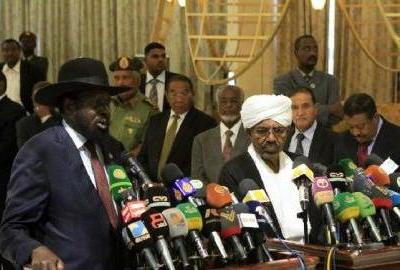Khartoum and Juba vow to settle disputes peacefully
May 3, 2016 (KHARTOUM/JUBA) – following the formation of the new transitional national unity government in Juba, Sudan and South Sudan expressed hopes to settle the post-separation issues peacefully and to have good cooperation.

Sudan and South Sudan still speak about presence of rebel groups in the two countries. Also, Abyei referendum and border disputed areas are still to be resolved as the two countries have to reach an agreement on border demarcation.
In a speech before the parliament in Khartoum Tuesday, Sudanese foreign minister Ibrahim Ghandour said that his government welcomed the transitional government of national unity and expressed hopes to work together for peace and stability in the region.
In Juba the South Sudanese cabinet minister Martin Elia Lomoro,said his government does not need to fight with the government of neighbouring Sudan from which it seceded in 2011 to settle the unresolved issues
South Sudanese cabinet affairs minister Lomoro told Sudan Tribune on Tuesday his government has a clear and unique approach to settling post -secession matters with Sudan.
“We don’t need to panic and fight in order to claim our rights. The issues which have not been resolved can be resolved amicably through peaceful dialogue” said Lomoro.
“The Sudanese themselves are rational. They know what is right and wrong. And even if they are tempted to claim what does not belong to them, they will never be secured and they will never feel free psychologically because you know when you have taken something which does not belong to you, you will always remain suspicious and trying to understand the reasons for which the person permitted you to take what does not belong to you”, he further said.
South Sudan, according to Lomoro, is currently in an unstable relations with Sudan but that does not mean the world youngest country and its leadership would compromise on sovereign matters.
“We will continue to dialogue with them because South Sudan and Sudan are not going to make a miracle to avoid being neighbours. We will continue to remain as neighbours in the same region and this is why it is very important to keep good relationship with neighbours because the two countries are going to remain neighbours forever,” he explained.
The minister called on Sudanese government to engage his country in direct negotiations to resolve unresolved post secession issues in the same way the 2005 peace agreement was reached or resort to international arbitration as the best approach to resolve differences related to border.
South Sudan broke out from Sudan in July 2011 after a referendum on self-determination held in January 2011.
In January 2016, Sudan opened border and allowed border trade between the population from the two sides. However two months later, President Omer al-Bashir ordered again to close border, and accused Juba of supporting the rebel groups.
However , the Sudanese foreign minister told the lawmakers that his government welcomes the new coalition government which is formed in line with a peace agreement between the warring parties after two year and a half of violence, adding they hope it would be a “honest partner” and cooperate with Khartoum.
“We welcome the new government, including the appointment of Deng Alor as a Minister of Foreign Affairs” Ghandour said and stressed his readiness to work with him in the interest of the two countries in order to build a model relationships in the region.
Alor, is from the disputed area of Abyei. His appointment was seen by many in Juba as an obstacle for good relations between the two countries, but the G10 insisted he is their candidate for the post in this coalition government.
In response to a question by the legislators, Ghandour said his government would work for the stability support peace in the neighbouring country.
He stressed that “security and stability of the South Sudan means also the security of Sudan” and urged Juba to stop supporting Sudanese rebel groups.
This week, the semi-official news service SMC said that a group of Darfur rebels who returned recently form South Sudan, has provided new evidence of Juba support to the rebels groups and their camps.
(ST)
